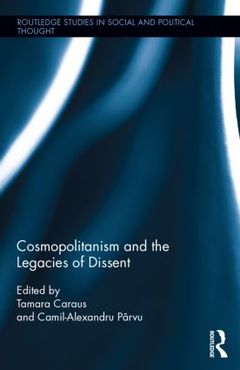Cosmopolitanism and the Legacies of Dissent Routledge Studies in Social and Political Thought Series
Coordonnateurs : Caraus Tamara, Parvu Camil Alexandru

The core idea shared by all cosmopolitan views is that all human beings belong to a single community and the ultimate units of moral concern are individual human beings, not states or particular forms of human associations. Nevertheless, the attempts to ground a political theory on overarching universal principles is in contradiction with the plurality of social, cultural, political, religious interpretative standpoints in the contemporary world. Is dissent cosmopolitan? Is there a legacy of dissent for a theory of cosmopolitanism?
This book is a comparative, historical analysis of dissident thought and practice for contemporary debates on cosmopolitanism. Divided into two parts, the editors and contributors explore the contribution of ?paradigmatic? dissidents like Gandhi, Martin Luther King, Havel, Sakharov, Mandela, Liu Xiaobo, Aung San Suu Kyi towards a post-universalist cosmopolitan theory. Part Two examines the inherent cosmopolitanism of the seemingly ?peripheral? dissent of contemporary forms of protests, resistance, direct action like NO TAV movement and Occupy Wall Street.
A timely book which allows for a much needed new engagement in contemporary debates of cosmopolitanism, we learn how practical resistance to totalizing/hegemonic claims is generated, and how dissident thinking might contribute to new, enriched ways of conceiving the non-totalizing foundations of cosmopolitanism. An innovative look at what lessons can scholars of cosmopolitanism learn from dissent/dissident movements, and what the role of dissent in cosmopolitan democracy could be.
Introduction: Cosmopolitanism of Dissent Tamara Caraus Part 1: Cosmopolitanism and the Legacy of Dissidence 1. Havel’s Agonistic Realism: What Can Cosmopolitan Thinkers Learn from the Eastern European Dissent? Bogdan Popa 2. Sakharov’s Dissent and Cosmopolitanism Áron Telegdi-Csetri 3.Remembering Dissidents: Cosmopolitan Challenges in Post-socialist Slovenia Ksenija Vidmar-Horvat 4.Is Liu Xiaobo a Rooted Cosmopolitan? A Critical Examination of his Dissent from a Historical Perspective Hermann Aubié 5. Aung San Suu Kyi and Cosmopolitanism as the ‘Revolution of the Spirit’ Tamara Caraus Part 2: Cosmopolitanism and the Legacy of Civil Disobedience 6. The Universalist Aspirations of Nationalist Dissent: Lessons from the Debates between Gandhi and Tagore Farah Godrej 7. Contestatory Cosmopolitan Citizenship: Martin Luther King’s Legacy Kostas Koukouzelis 8. Nelson Mandela and his Cosmopolitan Legacies Dan D. Lazea, Roxana Ghita, Camil Parvu 9. Civil Disobedience in Cosmopolitan Perspective: National Responsibility, Citizenship, Representation Michael AllenPart 3:Cosmopolitanism and the Promise of Global Resistance 10. Dissent, ‘Counter-knowledge’ and Cosmopolitanism in the NO TAV movement Alessio Calabrese 11. Channeling Dissent: Multicultural Encounters with Cosmopolitan Normativity Joanna K. Rozpedowski 12. Global Citizenship vs. Cosmopolitanism: Lessons Learned from Chinese Dissidents, Global Indigenous Peoples Movement and Convention on the Rights of People with Disabilities Barbara Arneil 13. The Logistics of Dissent: Prefigurative Politics in Occupy Wall Street Camil Parvu Conclusions Camil Parvu
Date de parution : 08-2014
15.2x22.9 cm
Disponible chez l'éditeur (délai d'approvisionnement : 14 jours).
Prix indicatif 111,58 €
Ajouter au panierThème de Cosmopolitanism and the Legacies of Dissent :
Mots-clés :
Cosmopolitanism; Dissent; Political Theory; Human Rights; Democracy; Protest; Social Movements; Contemporary Social Theory; Cultural Theory; Resistance; Representative Claim Making; Non-violent Resistance; Vice Versa; Human Suffering; Common Language; Direct Democracy; UN; Liu Xiaobo; Civil Disobedience; Cosmopolitan Dimension; Occupy Wall Street; Violated; Contemporary Societies; Rooted Cosmopolitanism; Cosmopolitan Citizenship; Cosmopolitan Potential; Cosmopolitan Moment; Civil Society; Susa Valley; Young Men; Prefigurative Politics; Nova Revija; Shared Fate; News Reel



